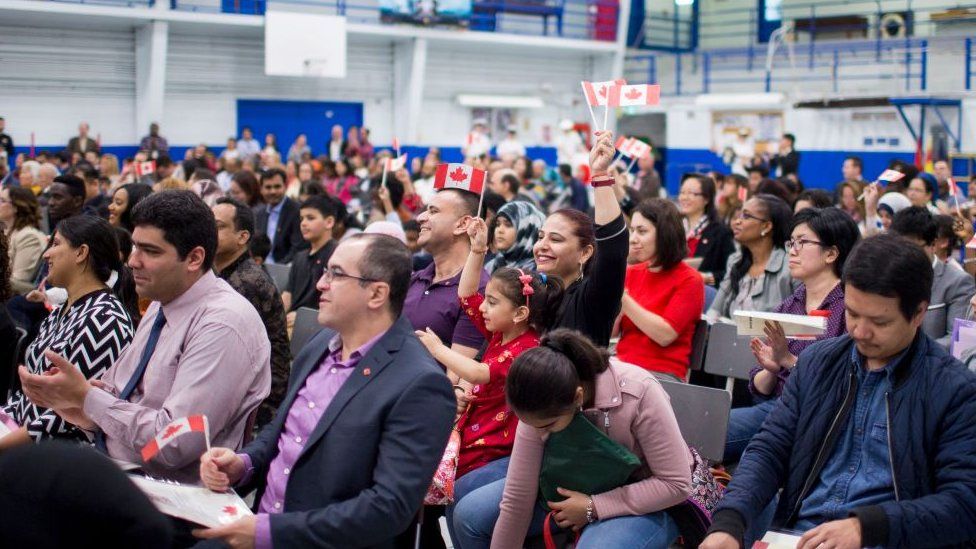"An Immigration Plan to Grow the Economy"
"Last year Canada welcomed over 405,000 newcomers - the most we’ve ever welcomed in a single year. The Government is continuing that ambition by setting targets in the new levels plan of 465,000 permanent residents in 2023, 485,000 in 2024 and 500,000 in 2025. The plan also brings an increased focus on attracting newcomers to different regions of the country, including small towns and rural communities."Immigration, Refugees and Citizenship Canada, Government of Canada"It's hard to see how the increased demand for both health and housing that would accompany large increases in immigration [assuming no other policy changes] would not further strain both systems.""We need immigration for other economic reasons."Arvind Magesan, economist, University of Calgary"Government talks about immigrants as if they're going to the immigrant store and picking up a few.""Even people born within a privilege situation in Canada are finding it hard to move beyond renting and working. Immigrants are coming and they're even less privileged."
"That doesn't seem to be a concern that's registering with the government. It's a very predatory situation."Stephen Punwasi, co-founder, data journalism website Better Dwelling
 |
| Canada is aiming to welcome 500,000 newcomers in 2025, and one of the goals is to help fill jobs with skilled workers. (Patrick Morrell/CBC) |
"According to the federal government’s own website, a skilled tradesperson applying to come to Canada today would have their application processed within 47 months – one month shy of four years. The express program for provincial nominees stands at 15 months.""There is a strong need for skilled trades but someone facing a four-year wait just to be processed is likely to look elsewhere. Demand for immigrants is high in developed countries and Canada will need to improve its system to compete.""We also need to do more to ensure the people we do welcome can flourish once here. The immigration department’s own website states that 'Overall immigrant and refugee earnings match the Canadian average about 12 years after arrival'.""How can Canada attract the best and brightest with processing times like this?"A 12-year timeframe for immigrants to catch up to Canadian-born citizens is too long. Part of the reason is there are too many barriers still in place stopping people from being able to find meaningful and lucrative work once they arrive.""There are also problems we haven’t touched on like the lack of housing and transportation infrastructure to handle so many new people each year and, sadly, the Trudeau government too often stands in the way."Toronto Sun editorial
Pew
Research found through a global survey in 2019 that Canada stood out
among its peer countries with the belief that immigration "makes our
country stronger". Canada was ranked the world's most migrant-friendly
nation through a Gallup survey of 2020. A 2022 poll by the Environics
Institute found 58 percent of Canadians backed the belief that Canada
"needs more immigrants".
While
many countries are increasingly suspicious of migration, Canadians tend
to welcome immigrants into their neighbourhoods, generally unconcerned
whether immigrants are prepared to integrate into Canadian society, and
they view immigration critical to the future of the country. Recently
the Angus Reid Institute asked Canadians if they felt immigrants were
taking their jobs and 71 percent responded "no".
Among
Canada's political parties there is no anti-immigration sentiment.
Recent months, however, have seen an opposite trend among Canadians with
respect to the government's new accelerated immigration numbers that
have risen over 40 percent in the past few years. A record-breaking
431,645 permanent residents entered Canada last year. On a per-capita
basis, Canada now brings in four times more immigrants than another
historically high-immigration country, our neighbour to the south.
Canadians
are now concerned with the nation's universal health care system, with
housing and with social welfare infrastructure. Health care in Canada,
already overstretched in capacity before the pandemic struck, has since
been barely limping along, failing dismally to look after the health
needs of the population, with surgeries cancelled and delayed and
hospital emergency wards closing down, unable to cope with the influx of
emergency cases.
 |
| Getty Images |
A
November poll commissioned by the Association of Canadian Studies saw
half of respondents expressing the belief that Canada was welcoming "too
many" immigrants. 75 percent of all respondents expressed "concern"
relating to what the immigrant surge could result in for the country's
immediate future. Most of the skepticism stems from a fear that two of
the country's most defining crises -- housing affordability and
health-care shortages -- will be negatively impacted by greater
immigration numbers.
Canada
has the distinction of having the most acute housing shortage of any
country in the G7; home prices since 2000 have become too steep for
normal people to buy up available stock. Canada came last in the OECD's
ranking of housing prices in comparison to average incomes last year.
Wait times for health care --never very reassuring -- are so acute now
that Canadians are treated to news of patients dying in hospital
emergency rooms.
A
poll by the Institute for Canadian Citizenship last year found that
among recent university-educated immigrants now in Canada, up to a
quarter were re-thinking their future, making plans to leave the
country, disappointed in their experiences to date. "Many new Canadians are having a crisis of confidence in Canada -- and that should be ringing alarm bells all over Ottawa", remarked ICC CEO Daniel Bernhard.
 |
| About one in four Canadians came to the country as an immigrant Getty Images |
Labels: Canada, Employment, Health Care, Housing, Immigration, Integration

<< Home